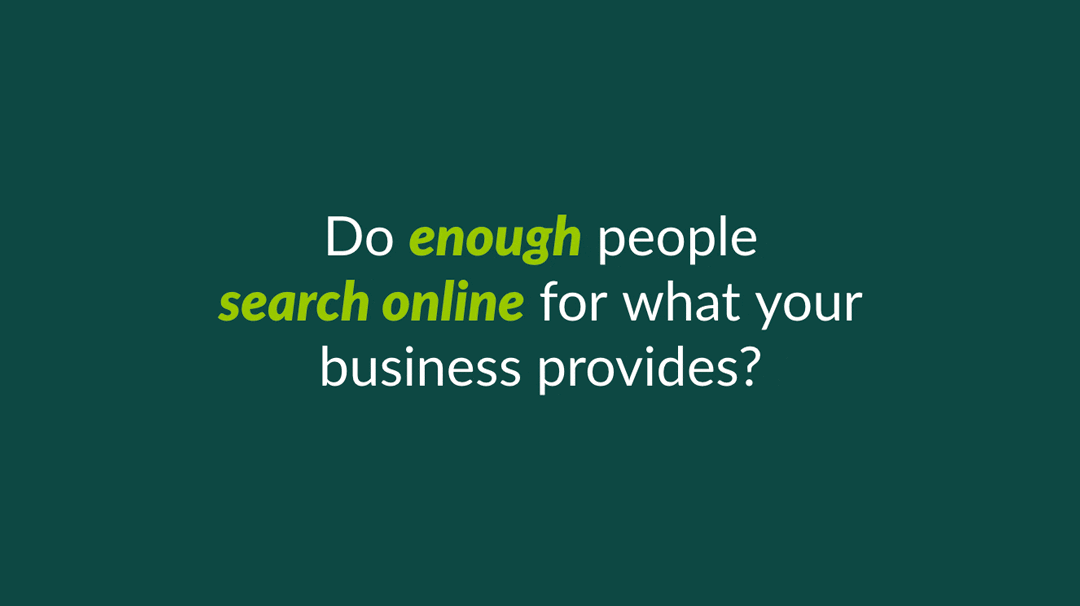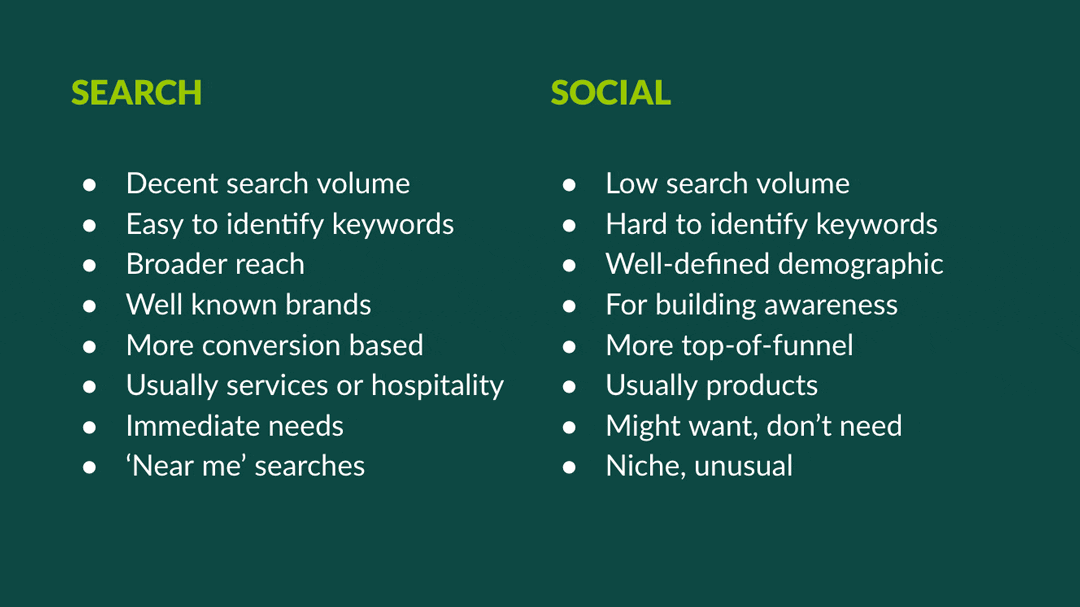Keywords or Characters
approx 7 minute read
Where should small businesses focus their marketing budget?
Keywords or Characters is another name for Search or Social.
It’s a framework to help you decide where to place your advertising resource.
Let’s assume you’ve got a small marketing budget. You’re faced with a tough decision:
Should you invest in search engine marketing (SEM) or social media marketing?
Both, please
Ideally, both would be great. But unless your budget stretches, you’ll likely need to choose one. At least, in the beginning.
So we’ve developed a simple framework to help you decide which approach best fits your business.
Explore why a business might lean toward Search over Social (or vice versa), and when it makes sense to invest in both.
Spoiler alert: this decision depends on your audience and your business goals.
Search-first vs. social-first: Which side are you on?
Let’s break down why you might prefer Search Engine Marketing (SEM) over Social Media Marketing, or vice versa.
Understanding this will help clarify where your marketing budget is likely to have the most impact.
No doubt you’ll instantly relate to a couple of the points here, so let’s get started.
Why choose Search Engine Marketing?
- High-intent audience
SEM captures people actively looking for your products or services. When someone searches for “emergency plumbing” or “window installers near me,” they’re ready to take action, which means SEM can lead to immediate conversions. - Better suited for immediate needs
Businesses that cater to urgent or specific needs often perform better on search. For example, if you offer services like legal advice, home repairs, or restaurant reservations, people will likely search for you when they need you. - Consistent and measurable results
SEM tends to offer more predictable and measurable outcomes. With tools like Google Analytics and conversion tracking, it’s easy to see which ads are driving results and adjust your campaigns accordingly. - Keyword-based targeting
SEM focuses on search queries—what people are actively looking for. If there are clear, high-intent keywords related to your business, this can be a goldmine for leads. Think “best insulated window installers” or “same-day delivery gift hampers.” - Broader reach for diverse audiences
Search engines have a massive reach. Google alone processes over 3.5 billion searches per day! This makes SEM a good option if your product or service has wide appeal or if your audience is spread across different locations.
Why choose Social Media Marketing?
- Audience engagement and community building
Social media is all about engagement. Platforms like Facebook, Instagram, and TikTok allow you to connect with your audience in real-time, building a community around your brand. If your product thrives on customer interaction or user-generated content, social media is a powerful tool. - Visual branding and content variety
Social media platforms are fantastic for businesses that rely on visuals. If your product is visual, like handmade jewelry or home interiors, social gives you space to showcase your work with photos, videos, and live demos. - Targeting based on demographics and interests
Social platforms let you get laser-focused with your targeting, allowing you to reach people based on their interests, behaviours, and demographics. For instance, if you sell 100% natural, organic vegan room fragrances, you can target eco-conscious consumers, even if they’re not actively searching for your product. - Wide reach on a low budget
Social media gives you the chance to get in front of a lot of people for a low price. If your content hits the mark, a well-timed post or an engaging video could get shared far and wide, giving you massive exposure without a huge budget. - Building brand awareness
Social is ideal for getting your name out there, especially if you’re launching a new product or want to build your brand’s personality. It’s great for top-of-funnel marketing. For catching people’s attention even if they’re not quite ready to buy.
The big question: Are people searching for you?
There is one key question that will really help identify the best approach for you…
Ask yourself, “Do enough people search online for what my business provides?”
It’s a simple but powerful question. If the answer is “yes,” then Search Engine Marketing might be your best friend.
If the answer is “not really,” or even ‘”not really sure”, then Social Media might be where the magic happens.
Still unsure? Let’s make it easy:
Is it easier to figure out what people are searching for? (Google it! What would you type?)
Or is it easier to identify the type of person who would be interested in your product or service?
Do your keyword research
You’re probably thinking, “But how do I know if people are searching for my business?” Good question! Sometimes you can go with your gut. Imagine being in your prospect’s shoes. What would you type into Google to find your business?
But if you’d like something a little more concrete (and who wouldn’t?), you can do some basic keyword research.
Free tools like Google’s Keyword Planner, Ubersuggest, or KeywordTool.io can help you see how many people are searching for your related terms.
They won’t give you a crystal ball, but they’ll help you see if there’s a big enough pool of people out there searching for what you offer.
Finally, you can get expert help. Ask us to perform Keyword Research for you. Best case scenario, we uncover some real game-changers.
Worst case, we’ll be able to tell you whether other people are searching to make SEO efforts commercially viable.
Distinct characteristics
Ultimately, there are a handful of additional considerations and characteristics that can help you easily define which side fits best.
Search-first businesses:
- There’s a decent amount of people searching for your product or service.
- The keywords are easy to figure out.
- You want a broad reach because you have a diverse audience.
- You sell a well-known brand that people seek out.
- Your business is more conversion-based.
- Typically suited to services or hospitality.
- Think of immediate needs and “near me” searches.
Social-first businesses:
- Fewer people are actively searching for your stuff (yet!).
- Keywords? Hmm…trickier to identify.
- Your demographic is well-defined (you know your people).
- You’re all about building awareness and relationships.
- You’re more top-of-the-funnel (aka you’re catching people’s interest early).
- You sell products or niche, quirky things.
- More “I might want that” rather than the “I need that now.”
I’ll take both, thanks
Just want to reiterate because this is an important point… These things are NOT mutually exclusive.
Should a business with a high search demand also be killing it on social? Sure!
Could a business serve people actively looking for solutions via search whilst also generating awareness and demand on Social? Of course!
Take a restaurant, for example.
People might search for “best Thai restaurant near me,” making Search super valuable.
But you can also build local awareness on social, sharing mouth-watering pictures of your food and promoting special events.
Win-win.
However, this article is aimed at those who have to choose between one or the other, at least initially, to decide where best to focus their bucks and attention.
Or, as things develop, to help decide what share of the overall budget makes sense.








Bingo!
You’re selling a visual, artsy product. Social Media, especially Instagram and Pinterest, is where your audience lives. People who like boho fashion and handmade goods? Yeah, you can totally target them on Social better than trying to guess their search queries. (What would they even search? “Cool clay earrings”?)
Check out our Social packages